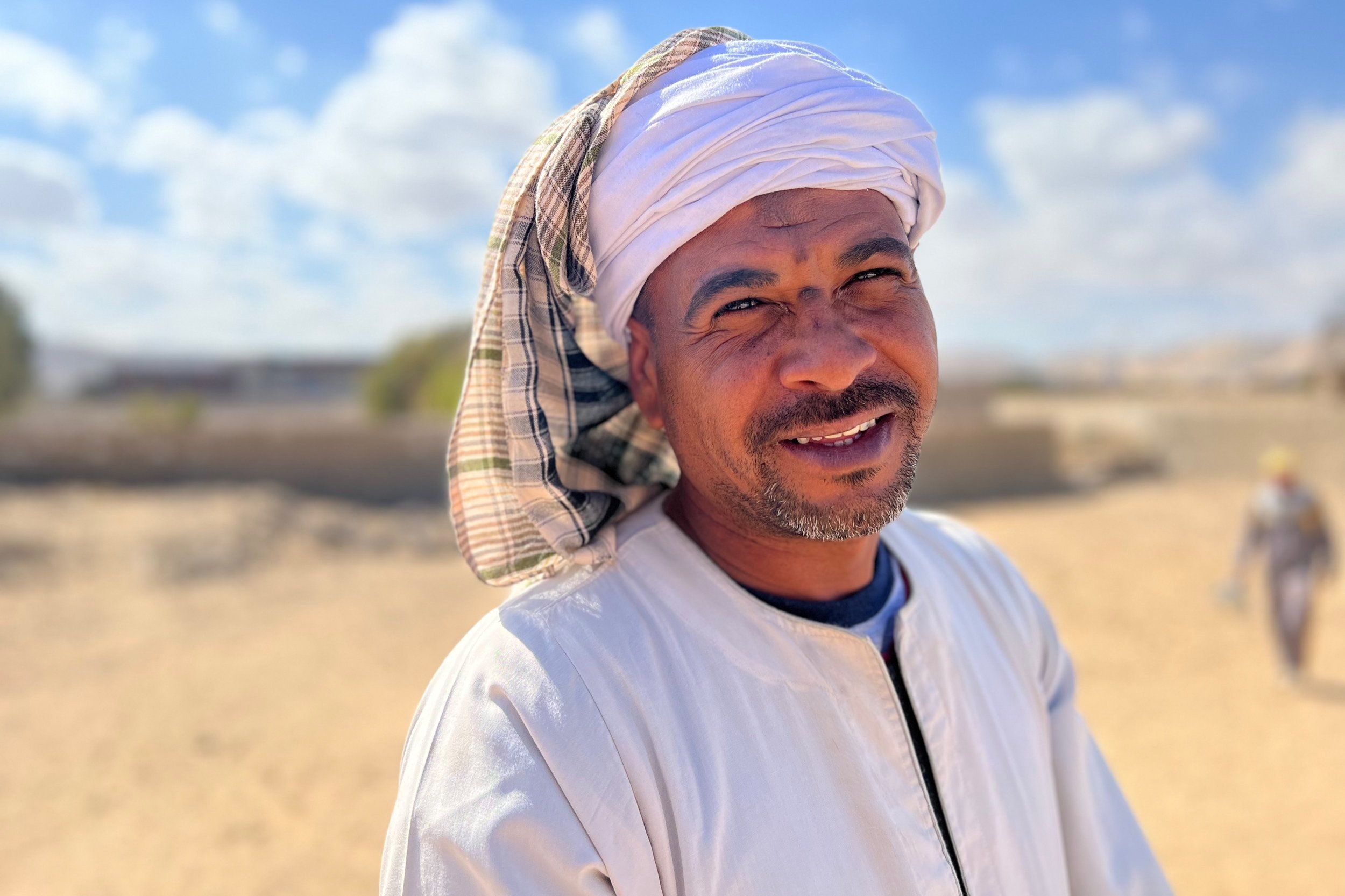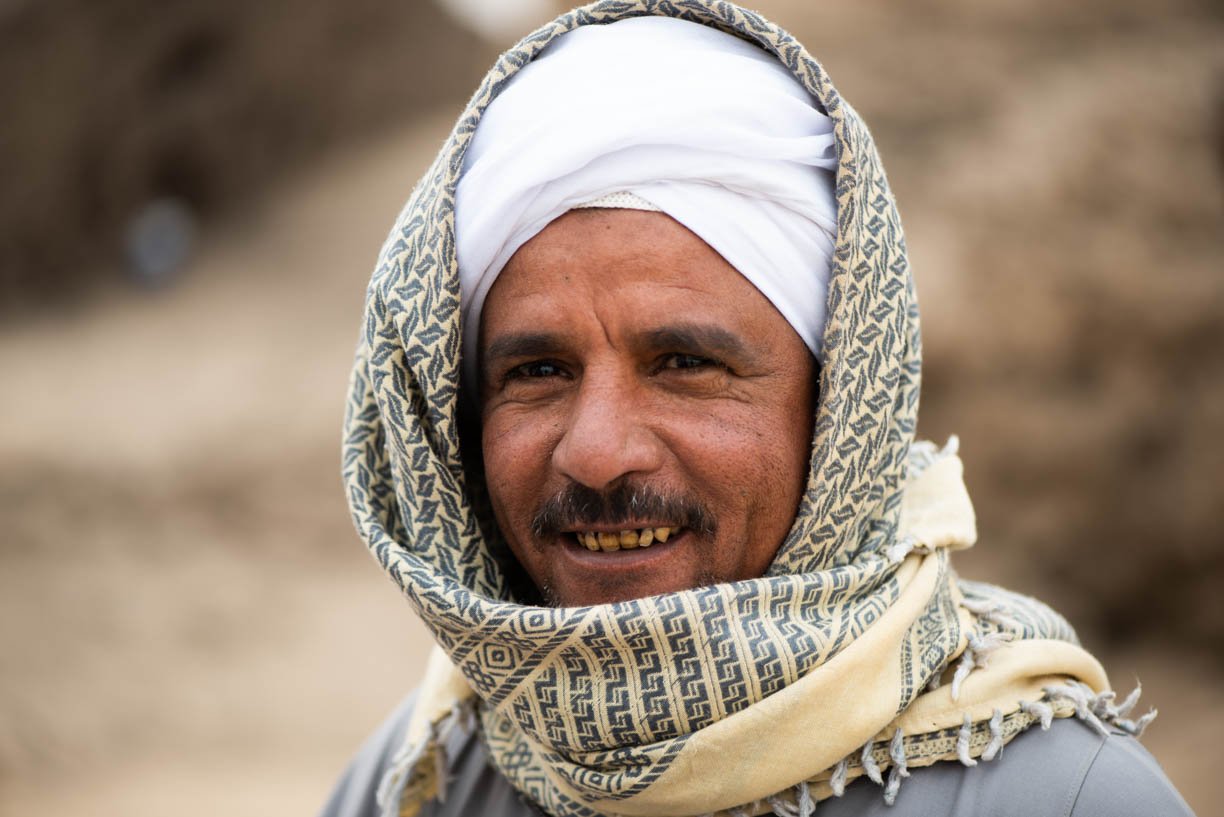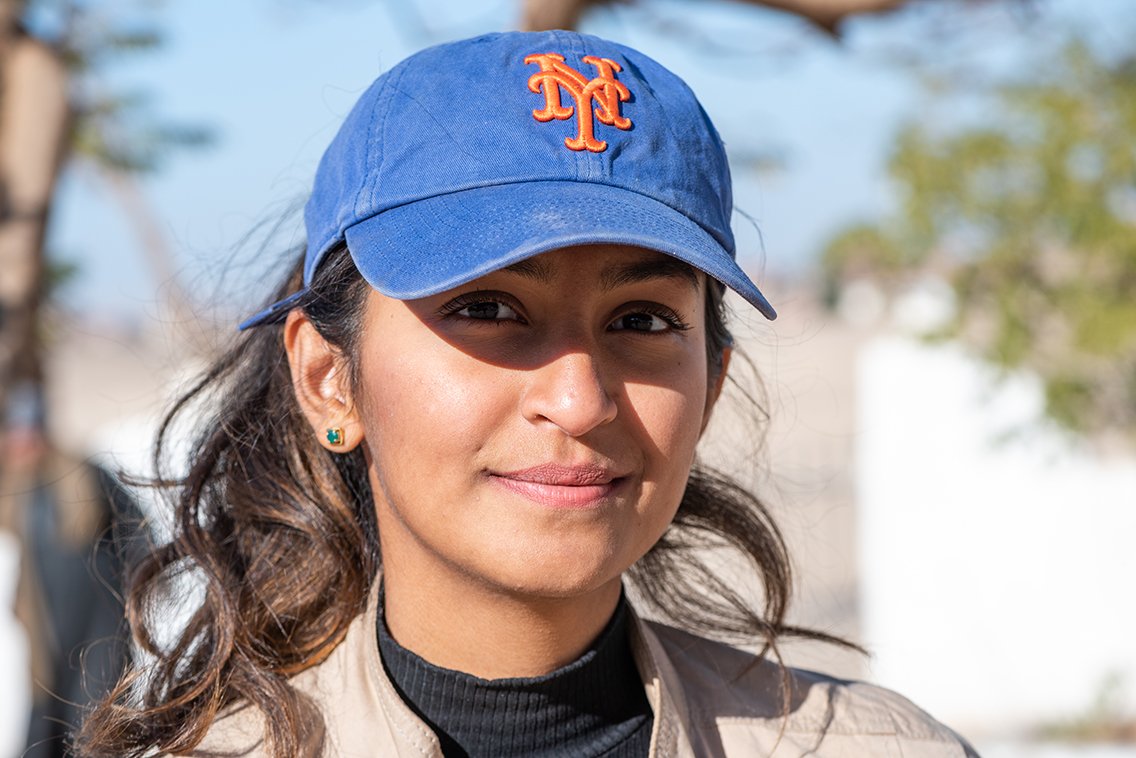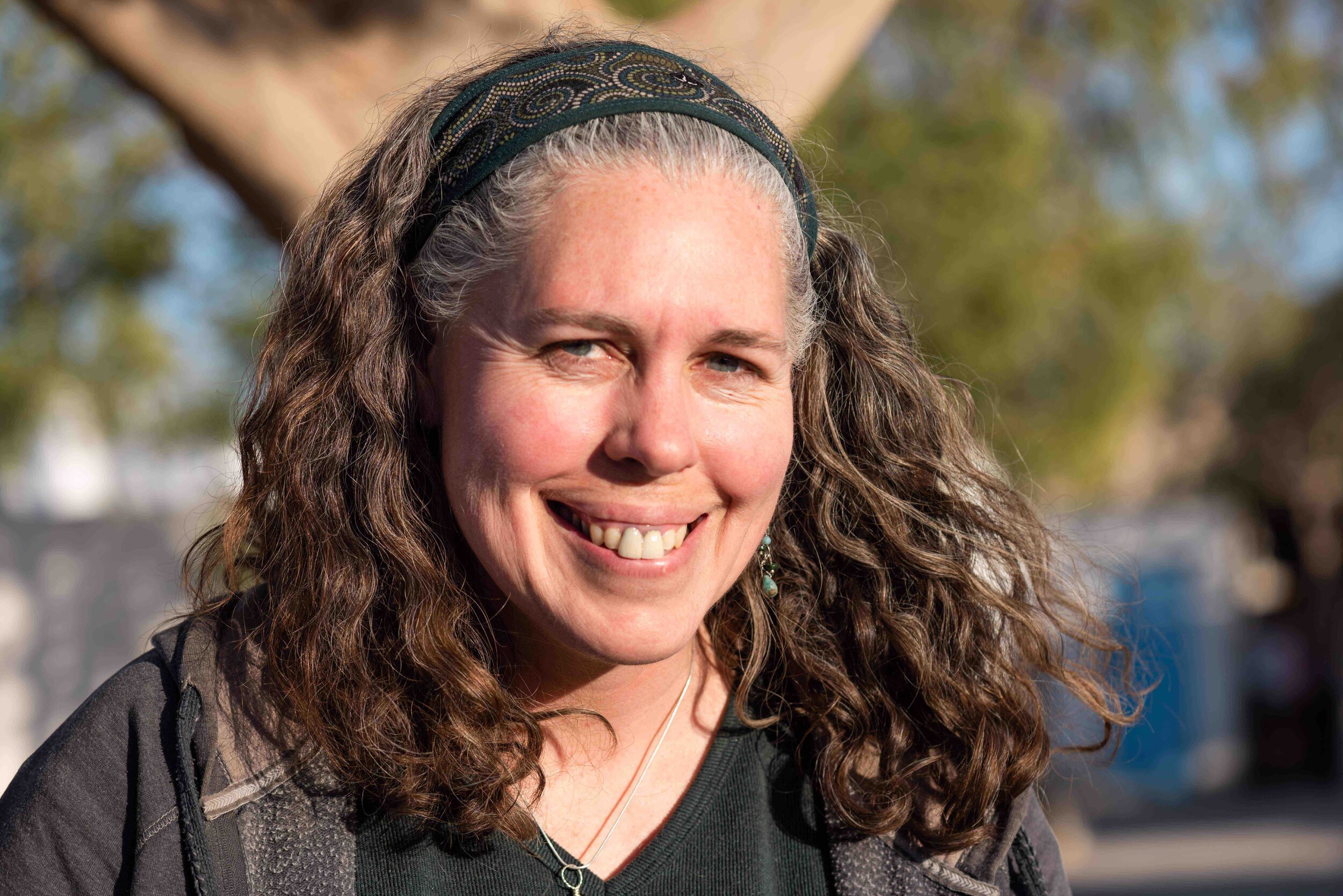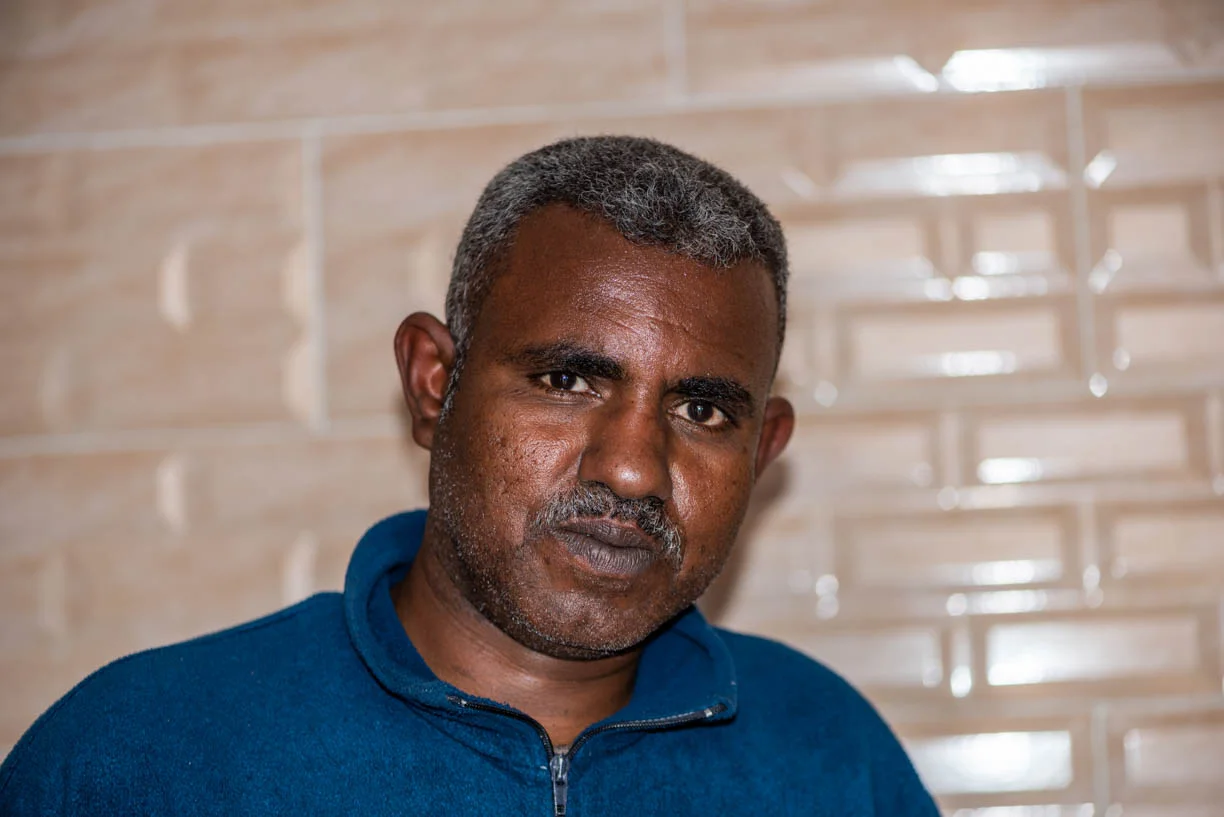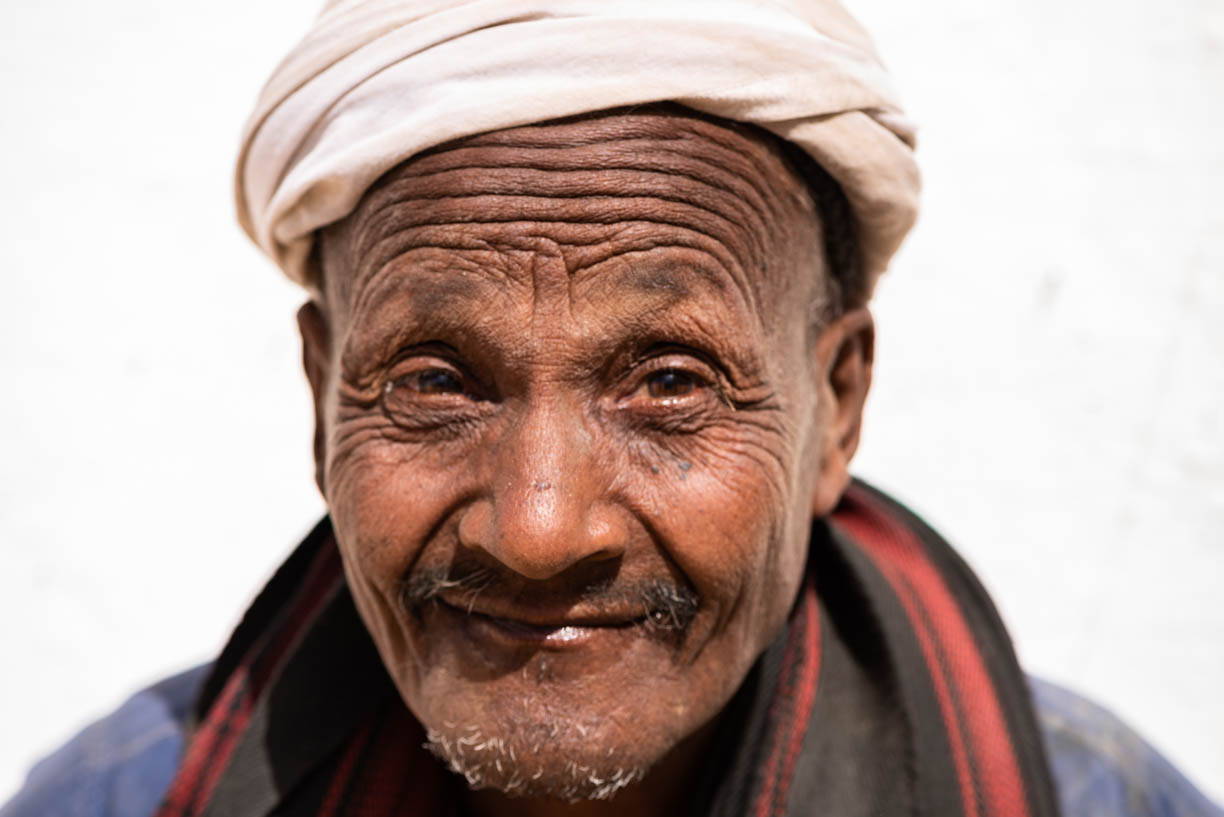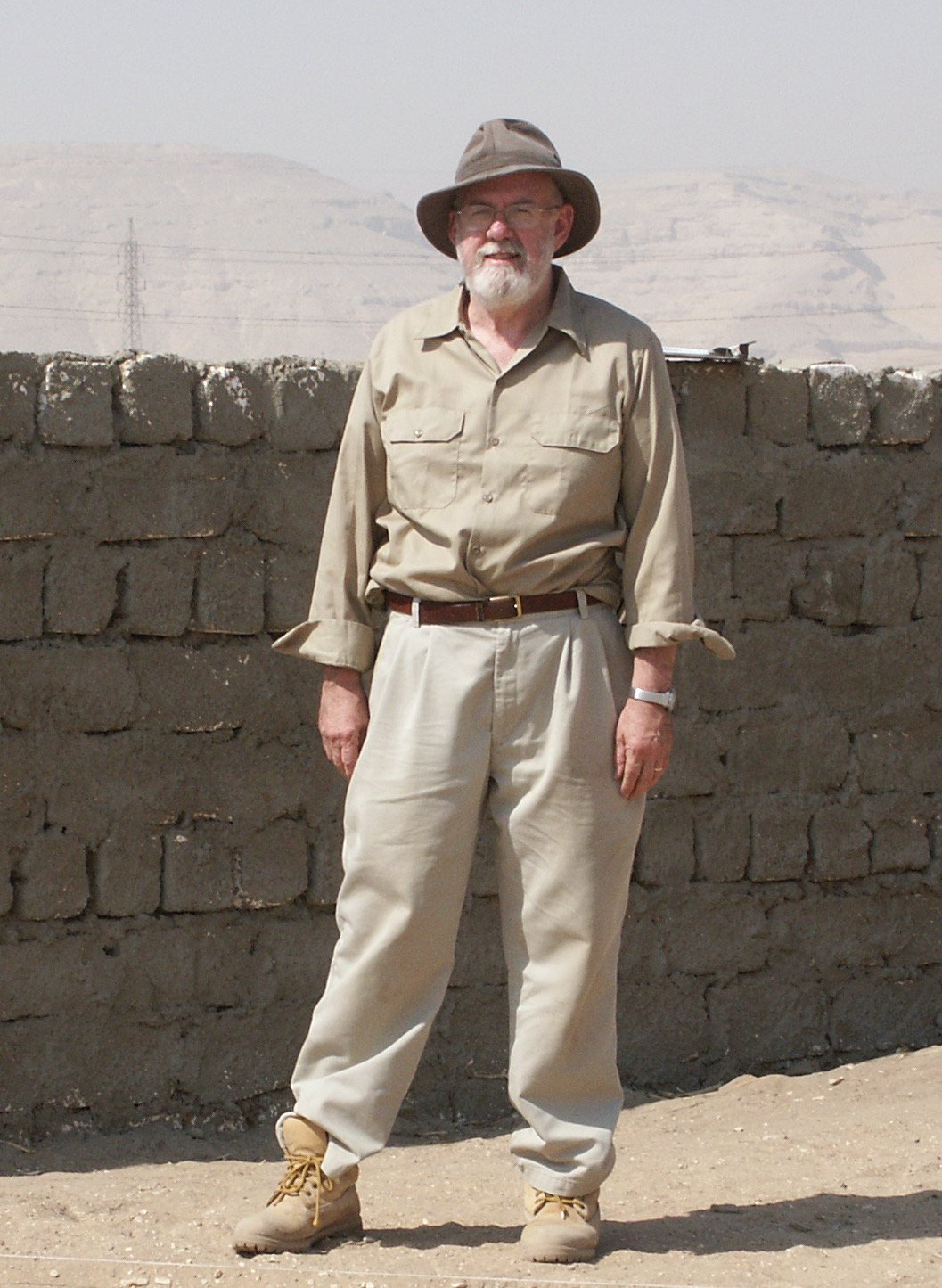Abydos Archaeology Team
These pages are dedicated to the memory of
Professor David O’Connor (1938–2022)
Reis Ibrahim Mohammed ‘Ali (1965–2023)
Dr. Matthew Douglas Adams, Project Director
Archaeologist, Egyptologist
Matthew Adams is a Senior Research Scholar at the Institute of Fine Arts, New York University, where he has directed archaeology at north Abydos since 1999. He holds a dual PhD in Anthropology and Egyptology from the University of Pennsylvania, where he began his fieldwork in the Middle East as an undergraduate and then graduate student in the early 1980s, including excavations in Turkey, Syria, and Egypt. He led his first excavation at Abydos in 1991, and since then he has directed excavations at many different areas of the site, from the predynastic to the late antique, and from the Abydos town site that was the subject of his PhD dissertation to the monumental cult enclosures of Egypt’s first kings. As Associate Director and Field Director of the Expedition from 1999 to 2017, in collaboration with Prof. David O’Connor, he led a range of initiatives that have redefined our understanding of the importance of Abydos in Egypt’s early history, the emergence of Egyptian kingship, and the transformation of the site into a religious center of national importance, in addition to directing a pioneering architectural conservation program at the Second Dynasty cult enclosure of King Khasekhemwy, known today as the Shunet el-Zebib. He has published, taught, and lectured widely on the archaeology of Egypt, and has been featured in The New Yorker, The New York Times, National Geographic Magazine, and a number of television documentaries. He recently edited the fourth volume of the Egypt at its Origins series, and has previously served on the Board of Governors of the American Research Center in Egypt and of the Egyptological Seminar of New York. He has worked as an archaeologist at Abydos for forty years and his most recent excavations have focused on the economic underpinnings of early royal activity at the site, including the re-discovery of the Abydos Royal Brewery in 2018, research which is currently supported by an NEH Archaeological and Ethnographic Field Research grant. His recent publications include “The Origins of Sacredness at Abydos” in Abydos: The Sacred Land at the Western Horizon (Peeters 2019) and “Abydos in Late Antiquity” in Abydos in the First Millennium AD (Peeters 2020).
Reis Ashraf Zeydan Mahmud
Archaeological Foreman
Reis Ashraf is an archaeological foreman and field technician from Quft, Upper Egypt. He began working in the field with his uncle, Reis ‘Abd al-Halim Sulayman, on the Swiss and German Archaeological Institute excavations in Elephantine and the Delta, before joining the Penn-Yale-IFA excavations at Abydos in 1997. He has worked at Abydos for over twenty-five years, specializing in excavation methods and archaeological materials. Reis Ashraf became head foreman at the site in 2024, where he is responsible for managing large field crews for archaeological research projects across the entirety of the Abydos landscape.
Dr. Mohammed Abu el-Yazid
Egyptologist, Archaeologist
Mohammed Abu el-Yazid is an Egyptologist and Inspector of Antiquities based in Sohag, Egypt. In his work for the Ministry of Antiquities since 2000, he has excavated extensively at Athribis, Luxor, Thebes, and Abydos, while also collaborating on many international projects at all of these sites. He holds a PhD in Egyptology from the University of Tübingen, an MA in Egyptology from Ain Shams University, and a BA in Egyptology from Cairo University, Fayum. Yazid has been excavating at and publishing on Abydos for more than twenty years, he joined the excavations at north Abydos in 2019. His recent publications include “Architecture of the Slaughterhouse of the Seti Temple at Abydos” in Abydos: The Sacred Land at the Western Horizon (British Museum Publications on Egypt and Sudan 8, Peeters, 2019) and, with Josef Wegner, “The Mountain of Anubis: Necropolis seal of Senwosret III tomb enclosure at Abydos” in Timelines: Studies in Honour of Manfred Bietak (Peeters, 2006).
Ashur Ahmed Mohammed
Archaeological Technician from Quft
Ashur is an archaeological technician from Quft, Upper Egypt, who specializes in excavation methods and pottery classification.
Sara al-Ashmawi
Registrar, Collections Manager
Sara is a Registrar at the Egyptian Museum in Cairo and MA student in Environmental Archaeology at Cairo University. She has worked in the Registration, Collections Management, and Documentation Department at the Egyptian Museum since 2012, where she handles museum accessions, collections database management, and object registration for loans and exhibitions. Her fieldwork experience includes the University of Arizona Excavations in Luxor, Egypt; the Archäologie für Westfalen-provinzialrömische Archäologie excavations in Haltern am See, Germany; and the SPAU excavations in Munzenberg, Germany. She holds a BA in Egyptology, as well as higher diplomas in Anthropology, African History, and Museum Studies from Cairo University. Sara joined the excavations at north Abydos in 2019.
Sheldon Baker
Archaeologist, Surveyor
Sheldon is an archaeologist with the U.S. National Park Service. He is a specialist in GIS data and geospatial technologies for archaeology and, since 2005, has worked in a variety of roles at Mesa Verde National Park, Flagstaff Area National Monuments, and Casa Grande Ruins National Monument. Prior to joining NPS, he worked as an archaeologist for the Chokepukio Archaeological Project in Cusco, Peru, and completed an MA in Anthropological Archaeology from the University of Pittsburgh with a thesis entitled “Inferring Inequality and Social Heterogeneity through Variation in Inca Period Domestic Architecture in the Valley of Cusco, Peru” (2001). Sheldon joined the excavations at north Abydos in 2024.
Pablo Barba García
Archaeologist, Egyptologist
Pablo is a PhD Candidate at the Institute of Archaeology, UCL, where his doctoral research focuses on the the entanglement of personhood, memory, and emotions in Predynastic children’s graves. He received an MA in Archaeology and Heritage of Egypt and the Middle East from UCL, where he was awarded the Margaret Murray Prize for his MA work in 2019 and the LaCaixa Foundation Fellowship for his PhD work in 2020-2022. He has a BA in Archaeology from the Universidad Complutense de Madrid, as well as several years’ experience in archaeological fieldwork and collections management in Spain, France, and the UK. His recent publications include articles in Archéo-Nil and Cambridge Archaeological Journal (2021). Pablo joined the excavations in north Abydos in 2024.
Kay Barnett
Archaeologist
Kay is an archaeologist with the U.S. National Park Service, based at Mesa Verde National Park in Colorado, where she has overseen the archaeological documentation and preservation of Ancestral Pueblo architecture since 2001. She has over thirty years of field experience in archaeological excavation, survey, and illustration, as well as artifact recording and analysis, architectural documentation and preservation, and site conservation. She holds a BA in Anthropology from Colorado State University. Since joining the project in 2009, Kay has overseen detailed scaled mapping and architectural documentation in the north Abydos excavations, including at the Shunet el-Zebib, the “Portal” Temple of Ramesses II, and the Abydos Royal Brewery.
Anthony Crosby
Preservation Architect
Tony is a U.S.-based preservation architect with more than forty years of experience in the conservation of historic structures and archaeological sites, including twenty-four years as a Historical Architect with the National Park Service. He specializes in the preservation of earthen architecture, and holds a Bachelor of Science, as well as a Bachelor and Master of Architecture from the University of Texas at Austin. Tony joined the project to oversee its architectural conservation efforts at the Shunet el-Zebib in 2004.
Ayman Damarany
Archaeologist, Photographer
Ayman is an archaeologist and Inspector of Antiquities based in Sohag, Egypt. Since 2007, he has directed, supervised, and collaborated on numerous excavations and archaeological projects throughout the greater Abydos area, from South Abydos to Umm el-Qa‘ab, Kom el-Sultan, the Seti Temple, and the North Cemetery. He is the director of the Abydos Temple Paper Archive and the Ahmose Tomb Project at Abydos. He specializes in bioarchaeology and archaeological photography, and has also worked in recent years as the site and object photographer for the American Research Center in Egypt at Luxor, including as an instructor in archaeological photography for ARCE’s field schools. He holds an MA in Anthropology from Cairo University and a BA in Archaeology from Sohag University. His recent publications include “The Apa Moussa Monastery in South Abydos” in Abydos: The Sacred Land at the Western Horizon (British Museum Publications on Egypt and Sudan 8, Peeters, 2019) and, with H. Salah, “The Seti Temple Slaughterhouse Depository” in Egyptian Archaeology (2016). Ayman joined the excavations at north Abydos in 2018.
Dr. Wendy Doyon
Historian, Website/Social Media Director
Wendy is an historian of archaeology and modern Egypt, specializing in the history of archaeological labor and economy in the nineteenth and early twentieth century. She received her PhD in History from the University of Pennsylvania in 2021, with a dissertation entitled Empire of Dust: Egyptian Archaeology and Archaeological Labor in Nineteenth-century Egypt. Her work is the first to examine the development of archaeology and antiquities management in relation to the history of Egyptian state and society under the Mehmed Ali dynasty. She is an expert on the history of the ruyasa-foremen from Quft and has written many research articles on the history of Egyptian archaeology. She also holds an MA in Museology & BA in Linguistics/Anthropology from the University of Washington, where she previously spent several years working in the archaeological and zoological collections at the Burke Museum of Natural History and Culture. She is currently a postdoctoral fellow based in Cairo, where she is writing a book based on her doctoral research. Wendy joined the excavations at north Abydos in 2019.
Hamada Fahim al-Rawi
Archaeological Technician from Quft
Hamada is an archaeological technician from Quft, Upper Egypt, who specializes in excavation methods.
Hany Fawzy ‘Ali
Archaeological Technician from Quft
Hany is a senior, fourth-generation archaeological technician from Quft, Upper Egypt, who specializes in excavation methods. He began working in the field in the early 2000s with his father, Reis Fawzy Mahmud Berberi, and has over twenty years of experience excavating at Aswan, Mit Rahina (Memphis), Saqqara, and German Archaeological Institute excavations throughout Egypt.
Joel Gamache
Archaeologist
Joel is an archaeologist with the U.S. National Park Service, based at Mesa Verde National Park in Colorado. He has over sixteen years of field experience in the southwest United States on projects ranging from excavation to survey work, architectural documentation, artifact recording and analysis, and museum collections management, including archaeological work for the Anasazi Heritage Center in Dolores, Colorado, Aztec Ruins National Monument, and a number of cultural resource management groups. He holds a BA in Anthropology from the University of Maine. Joel joined the excavations at north Abydos in 2020.
Mark Gonzales
Archaeologist, Surveyor
Mark is a geodetic surveyor and archaeologist based in Chandler, Arizona. He specializes in Geodesy, GPS, GIS, and remote-sensing data for archaeological and other specialized mapping systems, and has over thirty years of survey experience with both public and private organizations, including the U.S. Department of Interior and the United States Geological Survey. Mark joined the project to establish its geodetic control network in 2012.
Carole Graham
Archaeologist, Surveyor
Carole is an archaeologist with the U.S. National Park Service, currently based at Mesa Verde National Park in Colorado. She has over thirty years of field experience as an archaeologist and archaeological illustrator, surveyor, collections manager, lithics analyst, and educator/interpreter for the National Park Service, Bureau of Land Management, and US Forest Service, as well as for Crow Canyon Archaeological Center and numerous CRM projects in the southwestern US. She has worked at many sites and museums across the American West and Southwest, including Canyons of the Ancients National Monument, Manti-La Sal National Forest, Bears Ears National Monument, San Juan National Forest, Mesa Verde National Park, and many others. She is the author of numerous professional papers and reports on the archaeology and cultural resource management of ancient Pueblo and other prehistoric sites of the western US. She holds an MA in Anthropology from Northern Arizona University and a BA in Sociology/Anthropology from Knox College, Illinois. Carole joined the excavations at north Abydos in 2022.
‘Abdullah Hamdi
Archaeological Technician from Quft
‘Abdullah is a senior archaeological technician from Quft, Upper Egypt, who specializes in excavation methods.
Reis Waji Hamed ‘Ali
Archaeological Foreman
Reis Waji is an archaeological foreman and technician from Quft, Upper Egypt, who specializes in excavation methods. He has been excavating and leading field crews at Abydos for over twenty years.
‘Abdullah Ibrahim
Archaeological Technician from Quft
‘Abdullah is a fourth-generation archaeological technician from Quft, Upper Egypt, who specializes in archaeological conservation. He began excavating at Abydos with his father, Reis Ibrahim Mohammed ‘Ali, during the 2020 field season.
Peter Moore Johnson
Egyptologist, Archaeologist
Peter is a PhD candidate in the History of Art and Archaeology at the Institute of Fine Arts, New York University, where his research focuses on Kushite-era material culture and self-presentation in ancient Egypt and Nubia. He currently holds the Bernard V. Bothmer Fellowship at the Institute and was previously a Polonsky Foundation NYU-Digital Humanities Scholar. His previous field experience includes the Innsbruck-Leiden Excavations at Satu Qala, Iraq, and the NYUIFA Excavations at Sanam Temple, Sudan. He has several years’ experience in museum and curatorial work, including internships at the Brooklyn Museum of Art, Oriental Institute Museum, Cleveland Museum of Art, RISD Museum, and the Delaware Museum of Natural History, in addition to curating shows in New York, Chicago, and Providence. He holds an MA from the Institute of Fine Arts, NYU and a BA (Hons.) in Egyptology from Brown University. Peter joined the excavations in north Abydos in 2022.
Mohammed Kamal
Archaeological Technician from Quft
Mohammed is an archaeological technician from Quft, Upper Egypt, who specializes in excavation methods and pottery classification.
Hiroko Kariya
Senior Conservator
Hiroko is an internationally based art and archaeological conservator with extensive experience in Egypt. Since 1996, she has worked as a Site Conservator for the University of Chicago’s Epigraphic Survey at Luxor Temple, and has led a number of site as well as objects conservation projects at Abusir; Abydos; the Mut Temple at Karnak; the Valley of the Kings; the Brooklyn Museum of Art in New York; and the Freer/Sackler Galleries in Washington, D.C. She holds an MA in Art History and Conservation from the Institute of Fine Arts, New York University and a BA in Art History from the State University of New York at Buffalo. Hiroko has overseen the conservation team at north Abydos since 2009.
Nisha Kumar
Egyptologist, Archaeologist
Nisha is a PhD candidate in Egyptology and Archaeology at Harvard University, where her research interests include ancient Egyptian material culture, urbanism, and settlement archaeology. Her previous field experience includes the University of Alcalá Middle Kingdom Theban Project at Deir el-Bahri, the Neubauer Expedition to Zincirli, Turkey, the University of Arizona Egyptian Expedition at Luxor, and the Iklaina Archaeological Project in Pylos, Greece. After graduating with a BA in Art and Archaeology from Hunter College, she was a Humanities Fellow and research assistant at the University of Chicago Oriental Institute and participated in the Museo Egizio-University of Pisa curatorial summer school in Turin, Italy. She holds an MA in Ancient Middle Eastern Studies from the University of Chicago, where she wrote a master’s thesis entitled “(Re)-Constructing the Hyksos: Architectural Comparisons with Syro-Palestine.” Nisha joined the excavations at north Abydos in 2022.
Ahmed Mahmud Berberi
Archaeological Technician from Quft
Ahmed is a third-generation archaeological technician from Quft, Upper Egypt, who specializes in excavation methods. He has over forty years of experience in the field, including work with the early Penn-Yale-IFA excavations at Abydos.
Bedri Mohammed ‘Ali
Archaeological Technician from Quft
Bedri is a third-generation archaeological technician from Quft, Upper Egypt, who specializes in pottery classification.
Christine McAllister
Archaeologist
Chris is an archaeologist with the U.S. National Park Service, based at Mesa Verde National Park in Colorado, where she has supervised a number of prehistoric and historic archaeological sites since 2004. She has over twenty-five years of field experience on both public and private projects ranging from excavation to survey work, architectural documentation, condition assessment, and cultural resource management, and has co-authored a number of professional reports and presentations on the archaeology of Mesa Verde. She holds a BA in Anthropology from Marquette University. Chris joined the excavations at north Abydos in 2018.
Ahmed Ragab
Field Manager
Ahmed is the project’s on-site manager, with professional training in Tourism and Hospitality. He manages the Abydos field house, with responsibility for purchasing, accounts, logistics, and special initiatives, which have included the organization of an emergency response to looting at the site during the 2011 uprising and the construction of a site protection wall around the ancient town and temple area in Kom el-Sultan. Since joining the project in 1995, he has also overseen two major expansions of the Abydos field house and a series of renovations of its older facilities.
Jo Young
Archaeologist, Surveyor
Jo is an archaeologist and cultural resource program manager with the U.S. National Park Service, currently based at Navajo National Monument in northeastern Arizona. She has thirty years of field experience in the American Southwest and other cultural regions across the US, on both public and private projects ranging from survey, excavation, collections management, and lab work to resource advising on wildland fire lines. Her areas of specialization include architectural documentation, site conservation, GIS, and cultural resource management. She holds a Certificate in Anthropology and Museum Studies from Indiana University–Purdue University Indianapolis and a BA in English from Appalachian State University. Jo joined the excavations at north Abydos in 2010.
Field Management
Associated Team Members (since 2018)
In Memoriam
Prof. David O’Connor
1938–2022
Egyptologist, Archaeologist
David O’Connor was the Lila Acheson Wallace Professor Emeritus of Ancient Egyptian Art at the Institute of Fine Arts, New York University, where he joined the faculty in 1995. As one of the most distinguished and influential scholars in contemporary Egyptology and Egyptian archaeology, his career encompassed seminal contributions to anthropology and art history, as well as historical and material culture studies of both ancient Egypt and Nubia. His career in archaeology began when he was invited to join the Nubian Salvage Campaign while studying at University College London in the early 1960s. Shortly after the completion of the Nubian Salvage Campaign and the reopening of archaeological sites in Egypt to foreign researchers after a hiatus following the 1952 Revolution, he returned to Egypt to begin organizing an archaeological expedition with Prof. William Kelly Simpson, sponsored jointly by the University of Pennsylvania Museum of Archaeology and Anthropology and the Yale Peabody Museum of Natural History. The Penn-Yale Expedition to Abydos organized its first field season in 1967, touching off a half-century of excavations at the site under his leadership. After receiving his PhD from the University of Cambridge, Prof. O’Connor joined the faculty at the University of Pennsylvania, where he taught and mentored a new generation of Egyptologists and archaeologists, and curated the Penn Museum’s Egyptian collection for many years, until moving to the Institute of Fine Arts at New York University. There, he taught and published extensively on the history of Egyptian art and architecture, while continuing to direct the Penn-Yale-IFA Expedition to Abydos until his retirement in 2017. His research through the years, whether archaeological or art historical, consistently emphasized many of the less explored aspects of ancient Egyptian society and culture, such as the complexity of Egypt’s relations with Africa and the eastern Mediterranean in antiquity, and the nature of royal palaces and elite households, in addition to the meanings of the architecture and decorative programs of tombs and temples. He authored numerous books and articles, including the first comprehensive treatment of Abydos — Abydos: Egypt’s Earliest Pharaohs and the Cult of Osiris (Thames and Hudson, 2009), among many other noteworthy titles, which include The Old Kingdom Town at Buhen (Egypt Exploration Society, 2014); Ramesses III: The life and times of Egypt’s last hero, ed., with Eric Cline (University of Michigan Press, 2012); Ancient Egypt in Africa, with Andrew Reid (UCL Press, 2003); Mysterious Lands (Encounters with Ancient Egypt), ed., with Stephen Quirke (UCL Press, 2003); “Society and Individual in Early Egypt” in Order, Legitimacy, and Wealth in Ancient States (Janet Richards and Mary van Buren, eds., Cambridge University Press, 2000); Ancient Egyptian Kingship, ed., with David Silverman (Brill, 1995); Ancient Nubia: Egypt’s Rival in Africa (University of Pennsylvania Press, 1993).
In Memoriam
Reis Ibrahim Mohammed ‘Ali
1965–2023
Archaeological Foreman from Quft
Reis Ibrahim was a third-generation archaeological foreman from the town of Quft in Upper Egypt. Following in the footsteps of his father, Reis Mohammed ‘Ali ‘Abd al-Rahim Mahfouz, who worked for many years at Abydos with Prof. David O’Connor, Reis Ibrahim himself began working at Abydos in 1991. He was a central figure in the archaeology of Abydos for more than thirty years as both a technical specialist in methods of archaeological excavation and the head foreman at Abydos responsible for managing large field crews for many research projects every field season.















